LOST 004 - Any Question You Ask
Mother’s gonna put all of her fears into you, Mother won’t let anyone dirty get through.
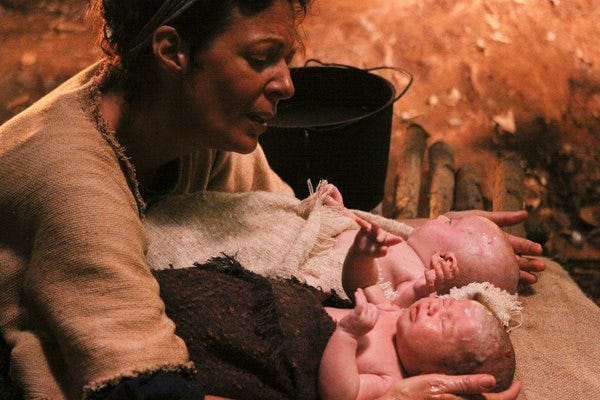
Note: this essay was originally published on Revue on January 24, 2022.
LOST time, my friendlies. Reminder: We’re exhuming as much of the buried understory of LOST as possible, so we’re armed with it before entering the main narrative. Our tools for this work will be the qualities I perceive as the narrative’s primary dialectic: observation and belief.
After flitting around the later seasons, I’m going to light for several installments on a single episode that serves as the Rosetta stone for much of the buried backstory, and which also serves as perhaps its biggest blunder (though not the blunder most people think it is): the antepenultimate episode, Across The Sea.
Today: a close reading of the first half of the episode.
In this episode there are three main characters: Jacob, his unnamed brother, and his unnamed adoptive mother. Jacob and his brother we’ve seen glimpses of, most of which I’ve already covered. Mother’s new.
We’ll need names for these characters.
Let’s keep calling Jacob “Jacob.”
Let’s call Jacob’s brother “Brother.”
Let’s call his mother “Mother.”
Family portrait time:
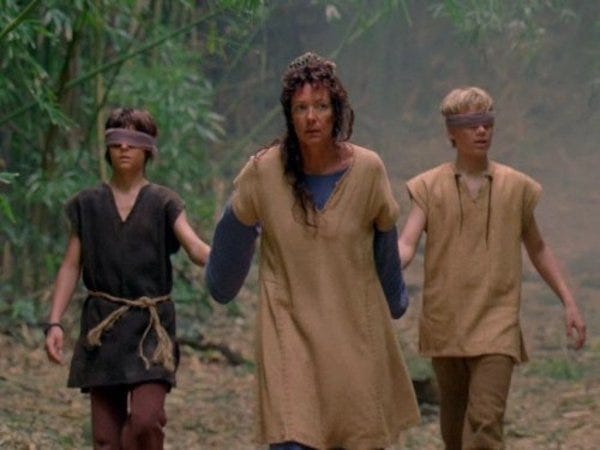
As for why this episode is the series’ Rosetta stone, it contains almost all of the direct information we ever will get about what the buried backstory is. Almost everything a viewer has received up to this point has either been speculation or lie or half-truth, delivered by characters who either know what they’re talking about but want to obfuscate, or don’t know what they’re talking about but think they do. Or sometimes—sometimes—they’ve been told something that’s true, though usually the way that information has been delivered has come in sideways, less as a revelation and more a claim or supposition from an uncertain messenger. None of it is particularly easy to sort out.
This will be the real stuff.
In true LOST fashion, the things the characters say will be full of misdirection; but careful observation will reveal many truths. In fact, I would say the amount of obscurely-delivered information the LOST team managed to pack into this single episode borders on the miraculous (which is not quite the same thing as saying it’s a good episode). You can keep coming back to it to find new implications every time, and I’m very much looking forward to sharing with you the ones I’ve found.
As for why this episode is a baffling error: it was the third to last episode of over 100 hours of an already very complex narrative! This was in a pre-streaming era. People who binged shows either taxed their TiVos memory, or did so months after the fact when they got the show on DVD—if at all. All of this means it was consumed in a slow trickle, one at a time. And this episode is presented in a way that demands 1) very close attention paid, preferably over multiple re-watches; 2) an ability and a willingness to not only remember but completely recontextualize almost all of what had been, again, over 100 hours of narrative TV, with key details delivered weeks or months or even years previously. It’s not realistic to think that audiences could do that, or would even think that they should.
If the purpose was to make people certain that a hasty conclusion had been slapped together, it would be hard to do so more effectively than this.
And people do still think that this episode represented the start of a hasty slapdash conclusion.
As you’ll see, I think otherwise.
Nevertheless, I do remain baffled. It’s clear to me a lot of this story was part of the plan all along, and as such it seems it would have been better parceled out over at least the course of the final season—perhaps as cold open—with what I think are the central revelations made just a tiny bit more clear for audiences who—even while some were parsing each episode like the Zapruder film—nevertheless mostly missed what what actually going on.
Then again, if they did that, what would I have to write about?
The fact that I feel compelled to explain what I think this narrative is, nearly 17 years later, speaks to a certain level of obsession on my part, I admit, but also both to the depth of the narrative created, and the creator’s perverse yet thematically correct insistence on (or maybe the scheduling necessity of) delivering almost all the deepest answers all at once, and as a reflection of a reflection, in a way that still leaves some of the deepest questions unasked and unanswered.
O B S E R V A T I O N
Wherein your humble apologist attempts to recap the first half of this episode as quickly as possible, which might not be very quickly, given that almost every moment here is significant.
<deep breath, running start>
A woman struggles in the ocean. We’ll learn her name is Claudia. She is finally washed up on the shore of the island, exhausted. We see she is very pregnant.
Claudia makes her way into the mainland. By a river, she meets another woman—Mother. The two speak in Latin. (They’re wearing old-times clothes So it’s the old times probably. There are LOST-opedias that place it 2,000 years from the present-day of the modern LOST narrative for reasons, and who am I to argue.)
They have this exchange:
Claudia: Where are the rest of your people?
Mother: There’s only me.
Claudia: How did you get here?
Mother: The same way you did. By accident.
Claudia: How did you—
Mother: Any question you ask will only lead to another question.
Claudia wants to find the rest of the people she was with, if there are any. Mother sharply refuses her, saying “If there are other people on the island, I will find them.”
Later, with Mother’s assistance Claudia gives birth to a boy, who she names Jacob. Then, a surprise: a second boy—Jacob’s twin. The woman confesses she only had the one name picked … then Mother, after what appears to be a moment’s serious thought, says “I’m sorry,” and bashes Claudia’s head with a rock, killing her. This is, in my opinion, the last time we see Claudia this episode.
Years later, the two boys have grown to early adolescence—raised by Mother. Jacob is loyal, obedient, stolid, incurious, almost simple—a follower. Brother is brooding, sharp-eyed, intelligent, curious, disobedient, rebellious, questing … and Mother’s favorite.
Both of them apparently get their hair cut at a salon. Mother must have mad scissor skills.¹
Brother discovers an ancient game (of backgammon?) on the beach, and instinctively knows how to play it. He keeps it secret from Mother (who he assumes will take it away from him) and teaches Jacob the rules he created.
Later, Mother is working at a loom.² Jacob appears and Mother demonstrates an extraordinary intuition for knowing that’s something secret has happened, and what it is. Jacob folds immediately and snitches. (This is sort of Jacob’s thing, as we’ll see.)
On the beach, Mother finds Brother, but she isn’t upset. Brother knows Jacob snitched, but he isn’t upset. There’s a mutual understanding between these two, and an ease, one which they acknowledge Jacob doesn’t share. “He’s not like you,” Mother tells Brother. “He doesn’t know how to lie. He’s not like you. You’re … special.” She tells him that she left the game for him and can keep it. Brother is disappointed by this.
Mother: Where else would it come from?
Brother: From somewhere else. Across the sea.
Mother: There is nowhere else. The island is all there is.
Later, playing at hunting, the boys discover a tribe of hunting men on the island, from whom they hide. They tell Mother about this, who firmly instructs them to stay away from them.
Mother says of the men these words,
They are not like us. We are here for a reason.
Then she says these words, which should be familiar to you:
They come. They fight. They destroy. They corrupt. And it always ends the same.
She then tells them a few lies, namely that the men come from another part of the island, that the men will hurt them, and that she has made it so that the two brothers cannot hurt each other. The boys have no follow-up questions to that last one, for some reason.
Blindfolding them, Mother leads them to a place on the island near a bamboo forest, a river leading into a cave, which is filled with light. This cave evokes awe in the boys. It is also clearly meant to evoke awe in the viewer. Very unfortunately, it looks like a painting by the kitsch artist Thomas Kinkade, the self-professed Painter of Light. Let’s call it “the Robert Kincave.”
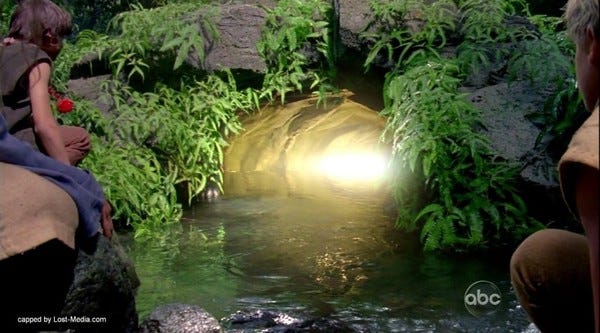
The boys are fascinated—Brother somewhat more than Jacob. It’s worth capturing the entire exchange that follows.
Brother: What’s down there?
Mother: Light. The warmest, brightest light you’ve ever seen or felt. And we must make sure no one ever finds it.
Brother: It’s beautiful.
Mother: Yes, it is. And that’s why they want it. Because a little if this very same light is inside of every man. But they always want more.
Jacob: Can they take it?
Mother: No, but they would try. And if they tried, they could put it out. And if the light goes out here, it goes out everywhere. And so I’ve protected this place. But I can’t protect it forever.
Brother: Then who will?
Mother: It will have to be one of you.
Later the boys play the game. Brother corrects Jacob on a point of the rules. Jacob complains that Brother made the rules up. Brother tells Jacob that one day he can make his own game and set his own rules, which is a bit on the nose—but let’s let that pass, because the game is interrupted.
Claudia appears to Brother, bathed in strange light. Jacob can’t see her. Brother leaves Jacob and wanders into the mainland, where he finds Claudia again. Claudia tells him a lot of truths: she’s dead, and the camp of people she takes them to aren’t just from another part of the island. She explains to Brother that they are his people, who were shipwrecked here with Claudia, after coming across the sea.
Brother: There’s nothing across the sea.
Claudia: There are many things across the sea. You come from across the sea too.
Then Claudia drops the bomb: Mother isn’t your mother. I am. The person you call “mother” killed me.
Ghost Claudia must be pretty convincing. That night, Brother decides to leave home. He tries to bring Jacob with him to the people, and tells Jacob what he’s learned about Mother. Jacob is confused, then scared, then angry.
Then Jacob jumps on Brother and pounds him in the face, brutally, repeatedly. Brother doesn’t resist.
Jacob is restrained by Mother, who doesn’t seem confused as to why Jacob is able to hurt his Brother. Jacob tells on Brother, as is Jacob’s wont.
Brother confronts Mother with what he knows, and begs Jacob to go with him. Jacob refuses. Mother tells Brother that no matter what happens, Brother will never be allowed to leave the island.
Brother leaves.
Later, Jacob and Mother speak by the beach. Mother doesn’t think Brother will ever return. She admits to Jacob that she killed Claudia, in order to protect him from the people.
Mother: Those people are bad—very bad. I couldn’t let you become one of them. I needed you to stay good.
Jacob: Am I good?
Mother: Of course you are.
Jacob: Then why do you love him more than me?
Mother: [soul crushingly long pause] I love you in … in different ways.
Mother asks Jacob to stay. Jacob agrees to stay, for a while. And that’s the first half of the episode.
Phew!
Let’s gather all our observations:
1) As a reminder, we have learned that underlying all this drama is an argument between two godlike beings, over the worthiness of humans, which leads the one arguing in favor to draw people to the island by way of accident, to present object lessons, in a purely observational experimental environment, to the one arguing in opposition—who in turn attempts to prove its case by deliberately corrupting the people so drawn.
2) The two beings have, until now, presented to us as (1) a man named Jacob, who I have referred to as The Island; and (2) a man dressed in black who can appear as black smoke, who I have referred to as The Adversary. Here we learn they both were human men who were born as human babies: in other words, they weren’t always godlike beings. And—they appear to have also been among those drawn to the island as part of the experiment.
3) Before these two arrived on the island, there was a similar being already on the island—Mother—who claims to have arrived at the island the same way as Claudia and her unborn sons—by accident. Which suggests that at some point Mother, too, was drawn to the island as part of the experiment.
4) There doesn’t seem to be an opponent for this godlike being to argue with. In fact, (in deeds if not in words) she seems to almost be in argument with herself. Much more on this next time.
5) Mother seems to possess many of the traits that we viewers will have already seen presenting in the personage of Jacob (in previous episodes, though at a chronological setting far in the story’s future from this episode): a charge to protect the island and a desire to maintain a distance between herself and other human beings on the island foremost among them—but also a predilection for looms, and a claimed ability to impose rules on others, and a sacred duty to protect the light of the island, and a desire to seek somebody else to inherit that duty. We’ll see further confirmations of this connection next time.
6) Mother also seems to possess many of the traits that we viewers have already seen present in the personage of the Adversary: her beliefs about human beings foremost among them, but also her ability to know what is happening anywhere on the island. We’ll see further confirmations of this connection next time as well.
7) The appearance of Claudia to Brother follows part of a pattern by which the Adversary attempts to corrupt humans brought to the island. In this pattern, the Adversary appears to the person in the guise of a departed loved one, and tells them things—usually true things—they don’t know, in order to affect their behavior or bring them to some point of resolution. A LOST viewer will have already seen this pattern play out several times, most recently in The Adversary’s approach to Ricardo, covered in the last installment.
8) The way that Mother speaks to Brother on the beach about the game, telling him he is special in ways his peer isn’t, completes the parts of the Adversary’s pattern that the apparition of Claudia leaves out.
Which is … interesting.
9) Mother seemingly has no interest in leaving the island. Brother seemingly has no interests other than leaving the island. Yet Brother is Mother’s favorite, by Mother’s own tacit admission. And, as she makes this admission, she singles out Brother’s ability to deceive.
Which is … also interesting.
10) Mother is the one who left the game—the symbol of Brother’s curiosity about what is across the sea, the symbol of Brother’s desire to leave the island—for Brother to find. Which suggests that Mother’s actual hopes for Brother’s behavior run counter to her stated hopes for Brother’s behavior.
Which is … also interesting.
11) Mother was lying when she said she had made it so the brothers can’t hurt each other—obviously so. Jacob can hurt Brother, and does. However, Brother doesn’t resist when Jacob beats him.
12) Some very important observations about the Robert Kincave that won’t get fully unpacked until next time but remember them: Mother appears to know what is down there. She also appears to know that the experience of finding out, while beautiful, will have a result whose consequence is worse than death. She also appears to believe that the light (which we as viewers will have already seen is the source of a perhaps cosmic level electromagnetic force) is also a spiritual nexus—in fact, she appears to believe it is the very source of human souls.
I would at this time like to offhandedly remark that the location of the source of human souls would be a dangerous piece of information for a godlike entity who hated humans to be in possession of.
B E L I E F
1) I believe we’re meant to assume that the entity I’ve called The Adversary exists within Mother—she’s the black smoke. It’s inescapably obvious that she uses the exact same phrasing—word for word—to describe the pattern of humans coming to the island as did The Adversary when speaking to Jacob during the cold open to “The Incident” (see Part 2). Either we must believe the writers chose this moment to get very lazy with copy and paste in their dialogue writing, or we’re meant to understand this overt connection.
2) I believe we’re meant to believe that the entity I’ve called The Island also exists within Mother.
This will be made far more explicit in the back half of the episode, as will my case for the idea that both godlike entities exist within the human known as Mother, and my suppositions about what that all means.
3) The argument/cycle first established in “The Incident” is currently ongoing, though—and already ancient even in these ancient times. Again, Mother’s words match those of The Adversary: “They come, the fight, they corrupt, they destroy … and it always ends the same.”
4) I believe that Claudia’s appearance to Brother is actually Mother/The Adversary appearing to him, in order to corrupt him in a very specific way. In other words, Mother wants Brother—her favorite—to leave her, not despite the fact that she thinks he’s special, but precisely because he’s special.
Mother left the human game for Brother, feeding his curiosity, drawing him to the human camp. Mother appeared to Brother as his murdered mother, and told him the truth, forcing Brother into self-exile.
Brother’s leaving Mother is part of Mother’s plan.
5) I believe Mother told the boys a half-truth: She has indeed made it so Brother can’t hurt Jacob … but she hasn’t made it so Jacob can’t hurt Brother.
(A fun riddle: Brother, unable, is Abel. Jacob, while able, is not.)
6) I believe that Mother is up to something, and we can even figure out what it is …
… but I believe we won’t start talking about what Mother’s plan actually is until next time.
L O S T
NEXT TIME: Mama, I Killed A Man
______
¹ There’s a considerable amount of the execution of this script that doesn’t land for me … which is fairly rare for LOST. Janney has been candid about having no idea who her character was, and getting no real help from showrunners Damon Lindelof and Carleton Cuse, which perhaps explains why her performance seems to suggest (I don’t know how else to put this) a modernity that’s anachronistic to the ancient time the writers seem otherwise to want to evoke. These kids’ salon-perfect haircuts are another bizarre example. (I actually have a story fix for the anachronisms, but there really isn’t enough story evidence present to call it a Belief. I’ll mention it some other time.)
² It appears to be the same loom we’ve seen an older Jacob working on, in a later time within the story’s chronology, though an earlier episode. A neat touch.
______
A.R. Moxon is the author of The Revisionaries, which is available in most of the usual places, and some of the unusual places. He’s done it, Pollock. He’s cracked it wide open.


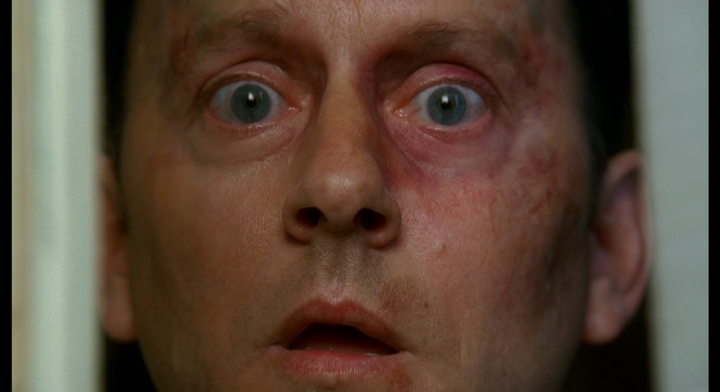
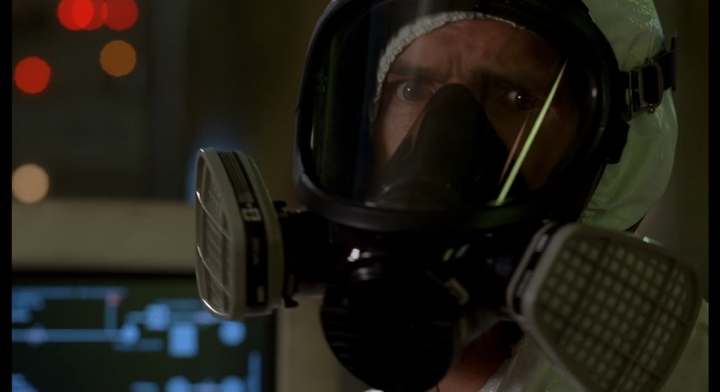
Comments ()